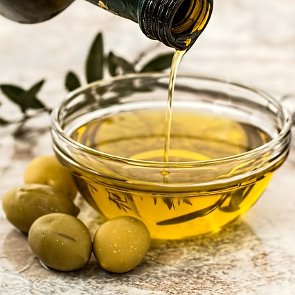6 Benefits of Olive Squalane for Your Skin
 Healthy human skin produces sebum (skin oil) that is supposed to keep it soft, hydrated and protected. Unfortunately, this can’t completely prevent water from evaporating from the deeper layers of the skin, so most people need to use moisturizers (creams, lotions, oils, etc.) to make up for the moisture loss. One of the common ingredients that can be found in skin moisturizers is squalane. What are the main benefits of squalane for your skin?
Healthy human skin produces sebum (skin oil) that is supposed to keep it soft, hydrated and protected. Unfortunately, this can’t completely prevent water from evaporating from the deeper layers of the skin, so most people need to use moisturizers (creams, lotions, oils, etc.) to make up for the moisture loss. One of the common ingredients that can be found in skin moisturizers is squalane. What are the main benefits of squalane for your skin?First of all, let’s figure out what squalane is. Human sebum is primarily composed of triglycerides, wax esters, free fatty acids, and squalene. Squalene is an organic compound that plays an important role in skin lubrication and protection. Its derivative, squalane, is used in cosmetic preparations as an emollient.
Squalane was first produced from squalene by hydrogenation (treatment with hydrogen) in 1916 and introduced as an emollient in 1950s. It was originally obtained from the livers of sharks, but today most squalane used in the cosmetic industry is environmentally friendly and cruelty-free because it is obtained from plant sources such as olive oil, rice bran, sugar cane, wheat germ, amaranth seed, and others. How exactly can your skin benefit from moisturizers formulated with olive squalane?
It Absorbs Well
Squalane is very similar to squalene, which, as we’ve already mentioned above, is a constituent of human sebum. This means that squalane absorbs rapidly into the skin and doesn’t leave a greasy residue on the skin surface. In addition, its ability to penetrate the skin easily makes squalane a great carrier for other active ingredients in cosmetics.
It Is Non-Comedogenic
Squalane’s ability to mimic the skin’s natural oil (sebum) means that it is non-comedogenic; it doesn’t clog pores, which makes it an excellent emollient for breakout-prone skin. In addition, it helps eliminate pathogenic bacteria that cause skin inflammation and acne.
It Is Suitable for All Skin Types
Actually, this is a logical conclusion from the previous paragraphs. As a non-comedogenic moisturizer, squalane can be used to hydrate any skin type, including sensitive, aging, and acne-prone skin. According to toxicology studies, in the concentrations used in cosmetic preparations, squalane has low acute toxicity, and it is not considered to be an irritant or contact allergen.
It Can Be Used to Treat Some Skin Conditions
Squalene and squalane are great at soothing and regenerating the skin affected by conditions that are characterized by red skin, itchiness, dry patches, and flaking. They include eczema (dermatitis) and psoriasis. However, you should keep in mind that self-treatment can be bad for you so the first thing you need to do if you have skin inflammation is consult a physician.
It Protects the Skin
Not only does squalane moisturize the skin, it also helps protect it from the negative effects of free radicals, UV radiation, and other environmental factors. Skin moisturizers with squalane reduce signs of aging and pigmentation in the skin, stimulate skin cell renewal, improve skin elasticity. However, you still need to use an SPF because squalane is not a replacement for sunscreen.
It Is Natural and Vegan
We’ve already mentioned this, but it won’t hurt to repeat. The times when cosmetic-grade squalane was obtained from shark liver oil are gone. Olive squalane that can be found in most cosmetic products is derived from a natural and renewable source. It is stable, environmentally friendly, and cruelty-free, which makes it a great skincare ingredient for environmentally conscious consumers.
Breadcrumbs
Filters
- Face, Body
Tags
Related Articles
- 8 Amazing Benefits of Aloe Vera Gel for Your Skin and Hair, Skin Benefits of Sea Buckthorn, 8 Amazing Benefits of Baobab Oil for Your Skin and Hair, 6 Tips for Your Fall Skincare Routine